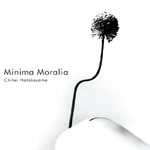Chihei Hatakeyama, "Minima Moralia"
 It's been written that this ground has been walked on before, but such a statement is an ignorant one that fails to acknowledge the finer moments of Chihei Hatakeyama's work. These recordings are anything but common, exhibiting an unusual attention to detail that surpasses the efforts of many like-minded musicians. Hatakeyama's work practically defines how musicality and expressionism can work well together.
It's been written that this ground has been walked on before, but such a statement is an ignorant one that fails to acknowledge the finer moments of Chihei Hatakeyama's work. These recordings are anything but common, exhibiting an unusual attention to detail that surpasses the efforts of many like-minded musicians. Hatakeyama's work practically defines how musicality and expressionism can work well together.Kranky
Hatakeyama has worked with the computer-centered duo Opitope prior to this release on Kranky; his dedication to processed sound shines through on Minima Moralia, but so does his appreciation for music. Where so many electro-acoustic projects find themselves meandering about in fields of half-melodic, atonal, completely abstract songs, Hatakeyama's music openly accepts melodic majesty and organic growth. Each of his seven songs soar on the back of glimmering sounds processed to oblivion and back, but each of them rely on the tiny movements of smaller, more important sounds. It is as if Hatakeyama's drones are merely a background for the microscopic movements that caress each song. That is not to be mistaken for a comment that suggests his drones are unimportant, but it is an observation that suggests Hatakeyama loves the small details more than anything else.
The music is certainly serene, exuding a calm that no ambient project I've ever heard as ever succeeded in realizing. The music, although minimal in nature, is entirely active, brimming over with the pulse of plucked guitars and emotive violin parts. "Swaying Curtain in the Window" flows forward gently and uninterrupted for a short period of time, but then the chime of guitars enters; every phrase contains a recognizable rhythm and a steady hand that guides them through loops and corkscrews. The interaction of these guitars is imperative to the track and Hatakeyama handles their mingling expertly. It's an addictively serene moment on the record and one that is repeated, in various ways, throughout the album. Hatakeyama isn't interested in putting anyone to sleep, his compositions are far too lively for that. It's this liveliness that gives the record its serene qualities, not the absence of movement or a static property.
Throughout each of the seven tracks, Hatakeyama drifts between the subconscious and the conscious, between the surreal and the alert. While some tracks revel in small percussive chirps or simple additions, others work because of their sudden surprises. "Inside of the Pocket" features a lovely melody on violin that appears virtually out of nowhere. Despite its sudden entry into the music, the simple appeal it brings to the music makes sense and does not interrupt what themes Hatakeyama had built up to that point. Hatakeyama builds the mood over the entire album incredibly well, but he manages to keep everything fresh by executing the element of surprise continually throughout the record. There may be a minimum of sources on Minima Moralia, but the music is broad, full of life, and constantly expanding from beginning to end. Nobody has covered ground quite like this before.
samples:



